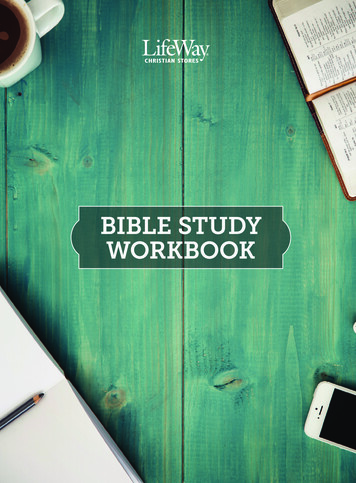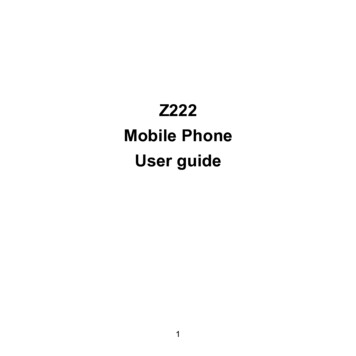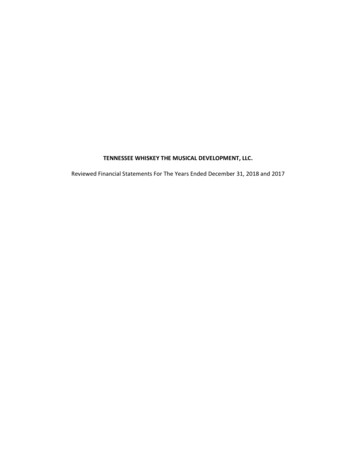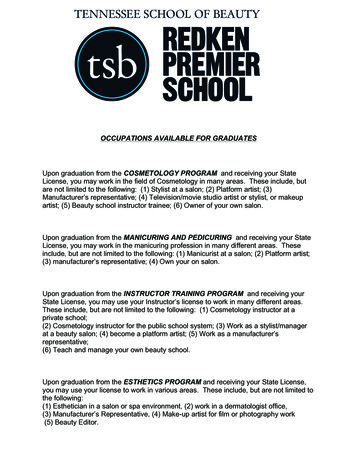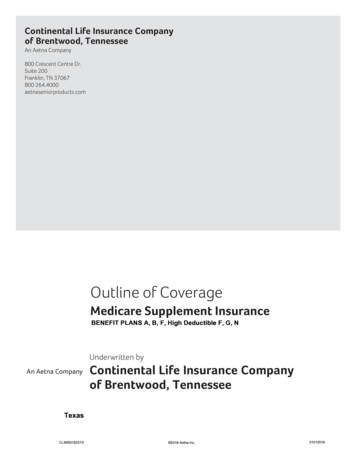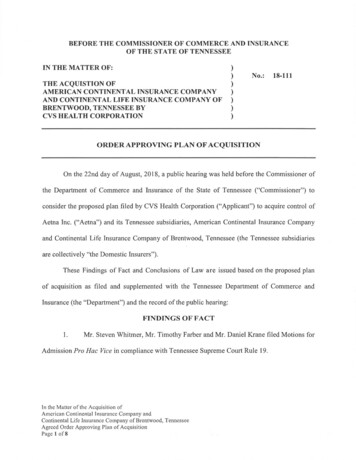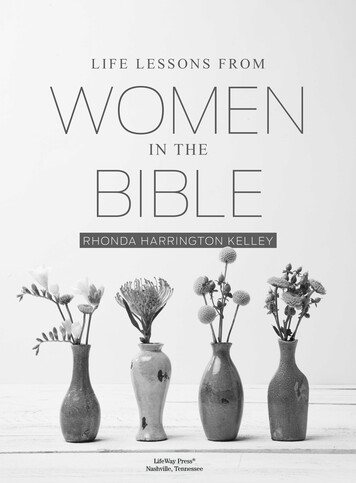
Transcription
LifeWay Press Nashville, Tennessee
LifeWay Press , Nashville, Tennessee 1998 LifeWay Press 2015 RevisedNo part of this book may be reproduced or transmitted in any form or by any means,electronic or mechanical, including photocopying and recording, or by any information storage or retrieval system, except as may be expressly permitted in writing bythe publisher. Requests for permission should be addressed in writing to LifeWayPress ; One LifeWay Plaza; Nashville, TN 37234-0152.ISBN 978-1-4300-4127-6Item 005737105Dewey decimal classification: 220.92Subject heading: WOMEN IN THE BIBLEUnless otherwise indicated, Scripture quotations are taken from the New King JamesVersion. Copyright 1979, 1980, 1982, Thomas Nelson Inc., Publishers. Scripturequotations marked HCSB are taken from the Holman Christian Standard Bible ,Copyright 1999, 2000, 2002, 2003, 2009 by Holman Bible Publishers. Used bypermission. Holman Christian Standard Bible , Holman CSB , and HCSB arefederally registered trademarks of Holman Bible Publishers. Scripture quotationsmarked NIV are taken from the Holy Bible, New International Version, copyright 1973, 1978, 1984, 2011 by International Bible Society. Scripture quotations markedThe Message are taken from The Message. Copyright 1993, 1994, 1995. Usedby permission of NavPress Publishing Group. Scripture quotation marked NASB istaken from the New American Standard Bible , Copyright 1960, 1962, 1963, 1968,1971, 1972, 1973, 1975, 1977, 1995 by the Lockman Foundation. Used by permission.(www.lockman.org)To order additional copies of this resource, write to LifeWay Church ResourcesCustomer Service; One LifeWay Plaza; Nashville, TN 37234-0113; fax 615.251.5933;phone toll free 800.458.2772; order online at www.lifeway.com; email orderentry@lifeway.com; or visit the LifeWay Christian Store serving you.Printed in the United States of AmericaAdult Ministry Publishing, LifeWay Church Resources, One LifeWay Plaza, Nashville,TN 37234-0152
CONTENTSAbout The Study . . . . . . . . . . . . . . . . . . . . . . . . . . . . . . . . . . . . . . . . . . . 4About The Author . . . . . . . . . . . . . . . . . . . . . . . . . . . . . . . . . . . . . . . . . . . 5Week 1: WOMEN IN THE BIBLE . . . . . . . . . . . . . . . . . . . . . . . . . . . . . . 6Ruth Abigail Gomer Mary and Martha DorcasWeek 2: WIVES IN THE BIBLE . . . . . . . . . . . . . . . . . . . . . . . . . . . . . 28Sarah Rebekah Rachel Elizabeth SapphiraWeek 3: MOTHERS IN THE BIBLE . . . . . . . . . . . . . . . . . . . . . . . . . 50Eve Hannah Naomi Mary, the Mother of Jesus Lois and EuniceWeek 4: WORKING WOMEN IN THE BIBLE . . . . . . . . . . . . . . . . 72Huldah The Proverbs 31 Woman Rhoda Lydia PriscillaWeek 5: WOMEN LEADERS IN THE BIBLE . . . . . . . . . . . . . . . . 96Miriam Deborah Esther Anna Phoebe, Damaris, Euodia and SyntycheWeek 6: WOUNDED WOMEN IN THE BIBLE . . . . . . . . . . . . . . 122Hagar Dinah and Tamar Mary Magdalene The Hemorrhaging Woman The Woman at the WellLeader Guide . . . . . . . . . . . . . . . . . . . . . . . . . . . . . . . . . . . . . . . . . . . . . 146 3
A B OUT TH E STUDYLife Lessons from Women in the Bible will give you opportunities to explore thelives of women in the Bible and to apply the lessons you learn to your life. This Biblestudy will be helpful to new Christians who want to begin studying God’s Word, as wellas to mature Christians who desire a deeper understanding of God’s Word.Life Lessons from Women in the Bible is a six-week, interactive Bible study withfive daily lessons each week. Each week’s study will focus on women of differentages and stages of life. Each day you will examine a specific woman in the Bible tolearn a particular life lesson. While every life has many facets, you will examine onlyone specific life lesson from each biblical woman you study. The daily lessons, to becompleted on your own, should take no more than 20 minutes. You will read aboutthe woman from Scripture, learn about her culture, and meet her family. Learningactivities focus on the woman’s life and testimony and help you apply what youlearn. Not all of the women are positive role models, so examine their actions byGod’s Word and learn from their mistakes. Esteem the godly women and follow theirexamples.Following each week of individual study, it is recommended that you gatherwith other women who are also studying this material. Small-group discussionswill give you the opportunity to learn from the insights of others and will motivateyou to learn more. Group involvement also promotes accountability and providesencouragement. Enlist a volunteer to lead the group discussion. A leader guide isprovided in the back on pages 146-158 of this book.The introduction to each week’s material suggests a life verse for the week—aScripture that reinforces an important life lesson. Read this verse frequently duringthe week from several different Bible translations. Write it in your own words so thatthe verse becomes more meaningful to you. Try to memorize each life verse to hideGod’s Word in your heart and to apply it in your life. As you seek to live a godly life,allow each life verse to guide you and draw you to Him.4
A B OUT THEAUTHORRhonda Harrington Kelley was called by God to ministerto women. She came to know the Lord personally as ayoung girl and grew spiritually with the encouragementof her Christian parents, her Sunday School teachers,and her Girls in Action director. As a teenager, Rhondadedicated her life to special Christian service.Rhonda grew up in New Orleans, Louisiana, where she graduated from John F.Kennedy High School. She received her BA and MS degrees in speech pathology andaudiology from Baylor University in Waco, Texas.In 1983, Rhonda earned a PhD in special education/speech pathology from theUniversity of New Orleans. Her career in speech pathology included clinical workin both hospital and private-practice settings. Rhonda served for 15 years as thedirector of the Division of Communicative Disorders at Ochsner Medical Institutionsin New Orleans, Louisiana.Rhonda and Charles S. (Chuck) Kelley Jr. married in 1974 after dating for 4years at Baylor University. Since 1975, they have lived in New Orleans, Louisiana,where Chuck serves as the president of New Orleans Baptist TheologicalSeminary. In addition to her responsibilities as the president’s wife, Rhonda isa teacher, an author, and a speaker. The focus of her ministry has always beenwomen. Women in the Bible have greatly influenced Rhonda’s life. As a younggirl, she memorized Proverbs 31:10-31 and sought to become that godly woman.Her greatest desire is to equip women to develop a personal relationship withthe Lord and live a godly lifestyle.5
WEEK 1WOMENIN THE BIBLEThis Week’s Life VerseThis woman was full of good works and charitable deeds which she did.ACTS 9:36
WO MEN LIKE YOU AN D METhe Bible is truth. It records the stories of real people, including manyinteresting women. Woman is first mentioned in Genesis 2:22-23 whenshe was created by God, “taken out of Man.” Designed as man’s counterpart, woman complements him in many ways. Created in God’s image,woman has equal worth and value, as well as a unique role and function inGod’s plan.The Bible mentions 187 women by name and includes hundreds of namelesswomen described as daughters, wives, mothers, widows, and so on. From thesewomen of the Bible, women today can learn valuable lessons. Whether you areyoung or old, single or married, a mother or childless, a homemaker or a businesswoman, you can clearly see God’s pattern for godly living in the lives of Old andNew Testament women.Many women in the Bible are best known for their relationships—whom theymarried or to whom they gave birth. Lessons about marriage and parenting can belearned from them. Other Bible women teach valuable life lessons about personalcharacter and godly womanhood. Let’s examine several Bible women as individualsto learn about Christian virtues. We can learn from these women of old because,after all, they were women like you and me.Women in the Bible7
DAY 1RU TH: A FA ITHFUL WIDOWThe Old Testament Book of Ruth records the story of a young woman fromMoab who chose by faith to follow the God of her mother-in-law, Naomi,instead of the gods of her ancestors. The Book of Ruth, named for its heroine, teaches many virtues of womanhood. While numerous life lessonscan be learned from Ruth, abiding faith is her strongest legacy.Read today’s background Scripture, Ruth 1–4.Ruth’s Legacy of FaithThough a Gentile from Moab, Ruth became an ancestor of King David and JesusChrist (see Matt. 1:5-16). Ruth was born in Moab, the narrow strip of fertile land tothe east of the Dead Sea. This well-watered area between the salty sea and a drydesert provided excellent conditions for farming and raising animals. The bounty ofthis land led Naomi and her family to Moab to escape the famine in Judah.Ruth, whose name means “something worth seeing” or “friendship,”1 grew upworshiping other gods but later chose to follow the one true God. She marriedMahlon, the Hebrew son of Naomi and Elimelech. Another son, Chilion, wed aMoabitess named Orpah. After the deaths of all three men, Naomi decided totravel home to Judah to live out her days with family. She encouraged her daughters-in-law to return to their families, but at that point Ruth chose by faith to followNaomi. A true friendship developed between the two women which was strengthened by a mutual faith in God and love of family.Read Ruth 1:6-18 to examine Ruth’s personal testimony of faith. How didRuth demonstrate her faith?8LIFE LESSONS FROM WOMEN IN THE BIBLE
What do you understand faith to be?Ruth 1:16-17 is known as one of the greatest statements of commitment and faithin history. Hebrews 11:1 defines faith as “the substance of things hoped for, theevidence of things not seen.” Ruth completely trusted in the God of Naomi, thoughshe could not see Him and did not know her future. You can have that same kind offaith in a God who loves you and has a perfect plan for your life.Ruth’s Life of FaithRuth’s faith demanded action in her life. By faith alone she left her family in Moaband followed Naomi to Judah. She trusted God to provide for them and later marriedBoaz, her kinsman-redeemer. Ruth turned to God to know what to do, where to go,and whom to marry.In chapter 2 Ruth meets Boaz, and in chapters 3 and 4 her future issecured. Review these chapters; then number the following events in theorder of their occurrence.Boaz condoned Ruth’s gleaning and provided her meals.Boaz married Ruth and fathered Obed, an ancestor of David.Ruth gleaned grain in the field of Boaz, Naomi’s relative. Ruth appealed to Boaz as her kinsman-redeemer (seeDeut. 25:5-10).Naomi proposed the plan for marriage.In this great romance of the Old Testament, Ruth went to Boaz’s field to pick upgrain. Boaz, a relative of Naomi, condoned Ruth’s gleaning in the field and providedmeals for the widows. Pleased with the meeting, Naomi proposed a plan that wouldlead to Ruth’s marriage to Boaz. Ruth appealed to Boaz as her kinsman-redeemer.According to Jewish law, the nearest male relative was obliged to marry the widowof his relative (see Ruth 3:9-12; 4:7). Sometimes a correlation is made between theredemption of Ruth by Boaz and the redemption of sinners by Christ.Ruth lived her faith. As a result, God blessed her and her descendants. Therewards of her faith were without end. Her faith was a blessing to Naomi, who wascared for with love; to Boaz, her devoted husband and provider; and to her childrenand grandchildren, through whom the Messiah was born. Her faith is also a blessingto us today as recipients of God’s gift of salvation through Jesus Christ.Women in the Bible9
Ruth’s Lesson of FaithAlthough Ruth’s family followed false gods, Ruth personally accepted the true God byfaith because of the example of her mother-in-law, Naomi. Like Ruth, you must trustin the Lord for your own salvation.Have you trusted in God for your salvation? If so, when did you firstprofess faith in Jesus Christ?Think of women who have been godly examples in your life. Thank Godfor the influence they have had in your walk of faith.I am grateful for my personal testimony of faith. As a 6-year-old, I chose to follow theGod of my parents. While their lives of faith were powerful examples to me, I had tomake a profession of faith for myself. In childlike faith I asked Jesus to come into myheart. My godly family nurtured my faith and challenged me to live my faith in myactions. I am grateful for the faithful women who have influenced my life, and I praythat God will use my life of faith to influence the women in my world.Faith was available to the Gentiles of Moab as well as to the Jews of Judah (seeEph. 3:6). God graciously offers salvation to all through the blood of Jesus Christ.Faith is not inherited and is not exclusive. That’s why Christians are commanded toshare the gospel with all people.When was the last time you shared with someone what Jesus Christmeans to you?Ruth’s faith was in God, not in herself or her circumstances. She was young, innocent,and weak. Her circumstances were tragic, hopeless, and insufficient, but God wasthe all-knowing, all-caring, all-sufficient Provider. God provides for those who havefaith in Him.10LIFE LESSONS FROM WOMEN IN THE BIBLE
How has God provided for you since you accepted Jesus by faith?Ruth’s faith demanded obedience. She followed God to Judah and to the fieldof Boaz. Her life of faith is an example to all believers. Faith must be lived in ouractions, not just spoken with our lips.How does your faith influence your actions?The Lord blessed Ruth because of her faith. Her blessings overflowed to Naomi,Boaz, and Obed. She was one of five women included in the lineage of JesusChrist (see Matt. 1:2-16). In fact, blessings have been experienced by Christiansthroughout the ages because of Ruth’s faithfulness. The Lord will reward yourfaithfulness as well.Women in the Bible11
DAY 2A BIGA IL: A W ISE BEAUTYAbigail was a beautiful, intelligent Hebrew woman trapped in a difficultmarriage. Her husband, Nabal, was a wealthy, cruel descendant of Caleb.Though her husband didn’t deserve her respect, Abigail was a devotedwife. She wisely committed herself to the marriage, and she wisely counseled David at a crucial time.Read today’s background Scripture, 1 Samuel 25:2-42.A Wise WomanThe Scripture describes Abigail as both beautiful and wise. Unfortunately, she married a man who is not described as graciously. Abigail, whose name means “my fatherrejoiced,” was the daughter of Nahash. She was married by arrangement to Nabal, awealthy landowner and shepherd. His name means “fool” or “rude and ill-bred.”List the words used in 1 Samuel 25:3 to describe Abigail and Nabal.AbigailNabalOther verses in 1 Samuel 25 give additional descriptions of Nabal: selfish, unwillingto share (v. 11); immoral, unspiritual; foolish, scoundrel (v. 25); drunk, glutton12LIFE LESSONS FROM WOMEN IN THE BIBLE
(v. 36). Abigail is described as wise, “a woman of good understanding” (1 Sam. 25:3).She wisely managed her household and saved the lives of her servants by givingDavid and his men food. She put the security of her servants before her own safety.Her wise actions preserved both herself and her household.A Wise WifeThough her husband acted foolishly, Abigail was wise. When Nabal refused David’srequest for food, Abigail intervened and delivered food to David and his men,averting his plan to kill Nabal. She wisely kept her actions a secret from her evilhusband. Though she planned to tell Nabal of her actions later, she changed hermind when she found him drunk (see 1 Sam. 25:36). The next morning Abigail toldher husband about David’s plan to retaliate and her provision of food. The Biblesays, “His heart died within him” (1 Sam. 25:37). He probably had a heart attack ora stroke, and he died 10 days later (1 Sam. 25:38).Like many women today, Abigail found herself in a difficult marriage. Biblicalinstruction to wives is submission to husbands, but a believer must first be submissive to God. Nabal was an ungodly man whose defiant actions would have broughtretaliation from David on his entire household. Abigail wisely submitted to God’sleadership and not to her husband’s poor judgment. Her actions were in the bestinterest of all, even selfish Nabal.Through the years, I have had several Christian friends who were married todifficult men. What a test to their patience and their faith! Each time the godlywife has surrendered herself to God and submitted herself to her husband, Godhas honored her commitment. In one instance, the unsaved husband trusted Jesusas his Savior. In several marriages, rededication to Christ brought about changesin their hearts. In one case, unfortunately, the husband left his wife and children.Christian women today must seek wisdom from God in life and relationships.Read in 2 Samuel 14:2-24 the account of another wise woman Davidencountered.The Wise Woman of Tekoa possessed unusual perception and dramatic persuasiveability. When David faced a difficult dilemma, God spoke through this wise womanin a memorable way. Her brilliant presentation, one of the finest speeches in theBible (vv. 13-17), moved David to compassion. As a result, David forgave his sonfor the murder of Amnon who violated Tamar, though the father and son nevertruly reconciled. This wise woman tactfully convinced David to call Absalom backto Jerusalem.Women in the Bible13
A Wise DecisionAbigail’s wisdom was also evident in her interaction with David. When Abigail delivered the food to him, she defused his anger with a humble confession and a generousgesture. She asked for forgiveness and praised his tolerance while arguing that itwould be wrong to seek vengeance against her husband’s household. Foreseeing theconsequences of such needless bloodshed on his future leadership as king, Abigailwas immensely wise in her approach with David.First Samuel 25:29 contains an interesting Hebrew saying: “The life of my lordshall be bound in the bundle of the living with the Lord your God.” These samewords often mark Jewish tombstones, referring to life beyond the grave. Theimage comes from the custom of bundling valuable possessions to keep them frombeing broken. Abigail was saying that David was in God’s bundle and was securelyprotected even though someone was pursuing him to take his life.2In 1 Samuel 25:32-33, David blesses Abigail for her courage and wise counsel:“Blessed is the Lord God of Israel, who sent you this day to meet me! And blessedis your advice and blessed are you.” David recognized Abigail’s wisdom. After thedeath of her husband, Nabal, David married her (see 1 Sam. 25:39b-42). Abigailwas certainly influential on his future leadership as king.Wisdom is a gift of God. Describe a time when God gave you wisdom tooffer help or to deal with a difficult situation.Thank God for giving you wisdom. Pray that He will give you wisdom to face eachday’s circumstances.14LIFE LESSONS FROM WOMEN IN THE BIBLE
DAY 3GOMER:A N EXA MPLE OF H OPEMany tragic situations seem hopeless. Many rebellious people seembeyond hope, but with God we can always have hope. The Bible containsaccounts of circumstances and people with no hope in sight. God, in Hissovereign power, intervenes and renews hope.Gomer, the adulterous wife of the prophet Hosea, is a biblical example of awoman who seemed beyond hope. As you read about Gomer’s return to God and herhusband, Hosea, you will see a glimpse of God’s unconditional love.Read today’s background Scripture, Hosea 1–3.Hope Is BornIn the land of Israel during the time of the Old Testament prophets, Hosea, adevoted servant of God, married Gomer, an immoral woman. Gomer, the daughter ofDiblaim, whose name means “given to sensuality,” is described as “a wife of harlotry”(Hos. 1:2). She gave birth to three children during her marriage to Hosea: Jezreel,Lo-Ruhamah, and Lo-Ammi. The hope of a fruitful ministry seemed to be dashed forthe young preacher when his wife left him for an adulterous lifestyle. Hope for herown faith also seemed to falter when she turned her back on God and her marriage.Gomer’s sinful rebellion symbolized another situation in the OldTestament. Read Hosea 2:16,9-20. What do you understand to be themessage of Hosea and Gomer’s marriage?Women in the Bible15
Marriage is meant to be forever and should be loving as well as faithful. Althoughtheir circumstances were real, Hosea and Gomer’s situation also symbolized theadulterous life of the nation of Israel. While Gomer committed physical adultery,Christians often experience spiritual adultery —unfaithfulness to God.3 However,there is hope in God’s love.Hope Is LostHosea must have felt hopeless as Gomer lived a publicly immoral lifestyle. When hischildren rebelled against God, he must have been devastated.Hosea 2 openly discusses the consequences of adultery. How doesadultery harm a marriage relationship?To the people of Israel, this marriage had no hope. The godly prophet may have beencounseled by concerned friends to divorce his sinful wife. That would certainly becommon advice today. However, Hosea loved his sinful wife and his children, likeGod loves His children, unconditionally.What does the Bible say about divorce when a spouse commitsadultery? Read Deuteronomy 22:22 and Matthew 19:8-9, thenrespond here.Mosaic law permitted divorce only in cases of infidelity, though later Jesus emphasized the permanence of marriage.Divorce is common today. Almost half of all marriages end in divorce, includingChristian marriages. When marital problems arise, Christian couples must followbiblical guidelines for marriage—a faithful union for a lifetime. Hope is not lostbecause God can restore and rebuild broken marriages. He paid the price toredeem His people and forgive their sins (see Titus 2:14). The reunion betweenHosea and Gomer is an example of hope.Hope Is RestoredBecause the prophet Hosea had faith in God, he did not give up on his marriage. Howcould he have hope in such a situation? His hope was based on God’s unconditionallove. Though it is difficult to have hope when facing life’s challenges, God is the God16LIFE LESSONS FROM WOMEN IN THE BIBLE
of hope. Hope is best defined as the certainty that God has something better for you.With his faith in God, Hosea lived to see his marriage restored.God told Hosea to marry Gomer, to bring her home, and to redeem her as hisown. The marriage of Hosea and Gomer was restored. Hope was reborn, but theLord gave specific terms for the reunion.Read Hosea 3:3-5 and identify the terms of the reunion.Hosea required Gomer to return to him, to their children, and to God. He expectedher to live a godly life. Reconciliation is a prominent theme in the Bible. God wantsHis children to be reconciled to Him and to one another.Read the following passages. Then list the requirements forreconciliation to God and others.Jeremiah 3:13-14; 4:1-2Hosea 2:14-20Romans 12:14-21God wants His children to obey Him and to live godly lives, but human nature issinful. Rebellion against God and ungodly behavior are natural to all people. TheBible reveals the only acceptable response to sin. Read 1 John 1:9 which says: “Ifwe confess our sins, He is faithful and just to forgive us our sins and to cleanse usfrom all unrighteousness.” Gomer discovered the joy of forgiveness and restorationthrough the Lord.There are many illustrations today of people who have rebelled against the Lordand lived ungodly lives. Some calloused sinners seem beyond hope. But, God givesWomen in the Bible17
hope to all, even in the most ungodly situations. The testimony of Iris Blue offershope to Christians today. Raised in a religious home, Iris rebelled as a teenager,getting involved in drugs, robbery, and prostitution. She spent years in prisonbefore she came to know the Lord. According to Iris, her life was changed whenshe prayed to receive Christ. She “knelt down a tramp and stood up a lady.” Hertestimony of hope is recorded in the book she co-wrote, Iris: Trophy of Grace.4Do you have unconfessed sin in your life that is keeping you fromenjoying a closer relationship with God? If so, write a prayer ofrepentance and pray it to Him right now.Is there a broken relationship in your life? Resolve to be reconciled withthis person. Write what you need to do to bring about reconciliation.Ask God to help you be reconciled.The Book of Hosea ends with a final call to repentance. When the sinful peopleturned from wickedness, Hosea’s message and Gomer’s life became ones of hope.Hope is available today even for those who have sinned grievously against God.18LIFE LESSONS FROM WOMEN IN THE BIBLE
DAY 4MA RY A ND MARTH A:S ISTERS WHOWORSHIPED AN D SERVEDThe names of Mary and Martha are usually linked, but they were verydifferent individuals. One was not better and the other worse. Theywere two women with different spiritual gifts and different personalities.While Mary worshiped Jesus, Martha served Him. While Mary sat sweetly,Martha bustled around the house. Yet both women had great spiritualinsight in recognizing Jesus as the Messiah and sought to honor Him intheir own ways.Read today’s background Scriptures, Luke 10:38-42; John 11:1-44;12:1-8.Sisters Who Loved JesusMary and Martha were born in Bethany, a town near Jerusalem, and were two ofJesus’ closest disciples. He often visited in the home of Martha, Mary, and theirbrother, Lazarus. The two sisters were opposites in personality, as dissimilar asbrothers Esau and Jacob in the Old Testament. Martha was the typical older sisterwho mothered Mary: “While Martha was practical and unemotional, Mary was impassioned and imaginative.”5 Let’s consider how they demonstrated their love for Jesus.You have read the accounts of the three encounters between Jesus andthese sisters. Review Luke 10:38-42 and answer the questions below.How did Martha serve Jesus?Women in the Bible19
How did Mary worship Jesus?Both women loved the Lord, but they expressed their love in different ways. Marthachose to serve Jesus and His disciples, while Mary worshiped. Martha warmly welcomed Jesus and began preparing food for the guests, while Mary sat at Jesus’ feet,hungry to hear His teachings. When Martha complained that Mary was not helpingher with the meal, Jesus lovingly reminded Martha of eternal matters and encouraged her to affirm Mary: “Martha, Martha, you are worried and troubled about manythings. But one thing is needed, and Mary has chosen that good part, which will notbe taken away from her” (Luke 10:41-42). Although Jesus did not condemn Martha’sunselfish service, He praised Mary’s loving worship. He reminded Martha of the mostimportant priority: to love and worship Him.Think about your service for the Lord. Are you so busy serving that youdon’t have time to worship Him? In the space provided below, writeways you can worship God in addition to serving Him.Sisters Who Loved Their BrotherFrom the accounts in Scripture, it is apparent that these sisters loved their brother,Lazarus. John 11:1-44 gives the account of the death of Lazarus. The sisters sentfor Jesus when Lazarus got sick because they were confident in His healing power.Unfortunately, he had died by the time Jesus reached Bethany. As Jesus talkedwith Martha, she declared, “I believe that You are the Christ, the Son of God, whois to come into the world” (John 11:27). It is clear that Martha recognized Jesus asthe Messiah.In this most dramatic miracle of Jesus, Lazarus was raised from the dead. Hehad been dead for four days (v. 17). It is interesting to note that, according toJewish tradition, the soul stayed near the body for only three days.6 Jesus knewthat Lazarus was dead before He arrived in Bethany, demonstrating His omniscience (vv. 14-15). When He raised Lazarus from the dead, Jesus demonstratedHis omnipotence (vv. 41-44).20LIFE LESSONS FROM WOMEN IN THE BIBLE
Read John 11:38-44. Summarize the account verse by verse in thespaces provided below.v. 38v. 39av. 39bv. 40v. 41av. 41bv. 42v. 43v. 44av. 44bThe sisters were together at the tomb when Jesus arrived. They saw His compassionfor Lazarus and heard His pleas to God. Then, the loving sisters witnessed theirbrother’s restoration to life and the conversion of many others who saw this miracleof Jesus.Sisters Who Worshiped and ServedThe final encounter of these two sisters in the Bible is recorded in John 12:1-8. AgainMartha was serving others, having prepared dinner for Jesus and His disciples. WhileMartha served, Mary anointed Jesus’ feet with expensive perfume and wiped His feetwith her hair. This act revealed that Mary also recognized Jesus as the Messiah. Withactions symbolic of preparing a body for burial, Mary sacrificed her most valuablepossession to express her love and devotion to Jesus.The anointing of the feet of Jesus instead of His head reflected Mary’s humility.Only the lowliest servant attended the feet of guests, which would be dirty anddusty from walking in the unpaved roads of Israel.7 When Judas Iscariot who laterWomen in the Bible21
betrayed Jesus objected, Jesus praised Mary for her actions (see John 12:4-7). Weread in the Matthew account of this incident that Jesus also praised Mary’s act ofhonor in preparation for His death and burial.Read His words: “Assuredly, I say to you, wherever this gospel ispreached in the whole world, what this woman has done will also betold as a memorial to her” (Matt. 26:13). How have you humbly andsacrificially expressed your love for Jesus?My sister, Mitzi, and I love and serve the same Lord
Read today’s background Scripture, Ruth 1–4. Ruth’s Legacy of Faith Though a Gentile from Moab, Ruth became an ancestor of King David and Jesus Christ (see Matt. 1:5-16). Ruth was born in Moab, the narrow strip of fertile land to the east of the Dead Se


